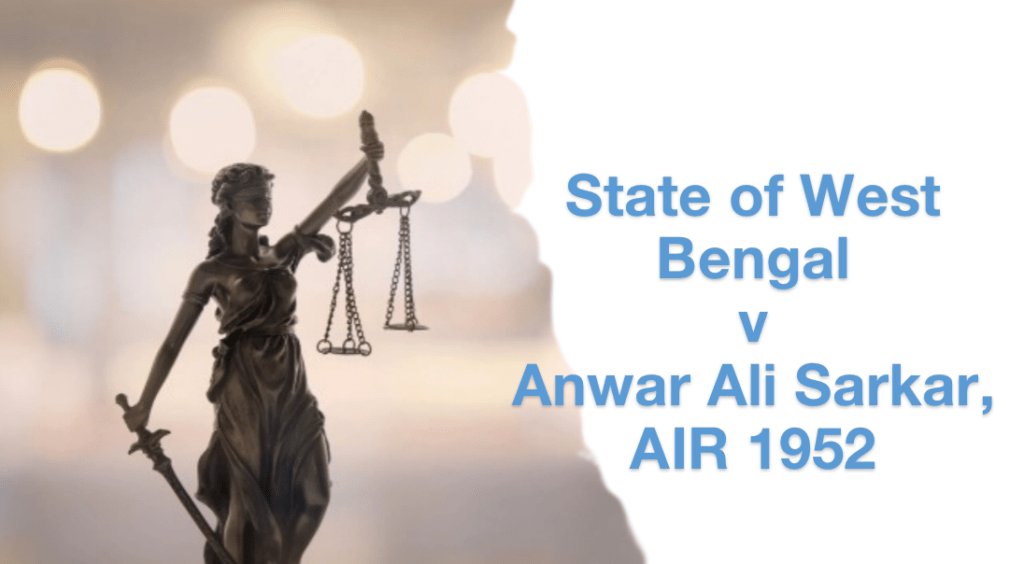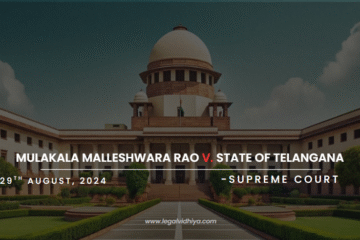
| CASE NAME | State of West Bengal v Anwar Ali Sarkar |
| EQUIVALENT CITATION | AIR 1952 SC 75 |
| DATE OF JUDGMENT | February 28, 1952 |
| Case no. | 1951 AIR 14 |
| Case type : | criminal appeal |
| Petitioner | State of West Bengal |
| RESPONDENT | Anwar Ali Sarkar |
| BENCH/JUDGE | Chief Justice Harries, Justice Chakravartti, Justice S.R. Das Gupta, Justice P.B. Mukharji, and Justice Bachawat. |
| Referred | The case dealt with the constitutionality of the West Bengal Special Courts Act, 1950, which provided for the establishment of special courts to try certain offences |
Introduction
State of West Bengal v Anwar Ali Sarkar is a landmark case in Indian legal history. The case, which was decided by the Supreme Court of India in 1951, dealt with the constitutionality of the West Bengal Special Courts Act, 1950. This act had been enacted by the West Bengal legislature to provide for the speedy trial of certain offences, including those related to the smuggling of goods, tax evasion, and corruption. The act had come under challenge on the grounds that it violated various fundamental rights guaranteed under the Indian Constitution, including the right to equality before the law and the right to a fair trial. The Supreme Court’s judgment in this case had far-reaching implications for the development of constitutional law in India, particularly with respect to the protection of fundamental rights.
Facts of The case
- Anwar Ali Sarkar was a resident of West Bengal and was suspected of being involved in various illegal activities, including possession of firearms and distributing seditious literature.
- In 1949, the West Bengal government passed an ordinance called the West Bengal Special Courts Ordinance, which allowed the government to set up special courts to try people suspected of certain crimes, including those mentioned above.
- Anwar Ali Sarkar was charged under this ordinance and was to be tried by a special court set up under the same ordinance.
- Anwar Ali Sarkar challenged the validity of the ordinance and the constitutionality of the special court in the Calcutta High Court.
- The High Court upheld the validity of the ordinance and the special court. Anwar Ali Sarkar then appealed to the Supreme Court.
Issues Raised
- Whether the West Bengal Special Courts Act, 1950, was ultra vires of the Constitution of India?
- Whether the provisions of the Act violated the fundamental rights of the accused?
- Whether the provisions of the Act violated the principle of separation of powers?
- Whether the provisions of the Act violated the right to equality before the law?
- Whether the provisions of the Act violated the right to a fair trial?
- Whether the provisions of the Act violated the right to legal representation?
Contention of petitioner
The petitioner in the case, Anwar Ali Sarkar, raised several contentions, which can be summarised as follows:
- The West Bengal Special Courts Act, 1950, is unconstitutional as it violates the fundamental right to equality before the law and equal protection of the law under Article 14 of the Indian Constitution. The Act creates two classes of offenders – those tried by special courts and those tried by ordinary courts – without any reasonable basis for differentiation.
- The Act violates the fundamental right to freedom of speech and expression under Article 19(1)(a) of the Constitution. The Act empowers the government to prosecute and punish individuals for their beliefs, opinions and thoughts, which is a direct infringement of the right to freedom of speech and expression.
- The Act violates the fundamental right to a fair trial under Article 21 of the Constitution. The Act deprives the accused of the right to a fair trial by a competent, independent and impartial court.
- The Act violates the principle of separation of powers enshrined in the Constitution. The Act empowers the executive to set up special courts, which are not independent of the executive.
- The Act is violative of the principle of federalism enshrined in the Constitution. The Act encroaches upon the power of the state governments to administer justice within their respective territories.
Contention of Respondent
- The respondent argued that the Act violated several provisions of the Indian Constitution, including Articles 14, 19, and 21.
- The respondent’s main contention was that the Act violated Article 14 of the Constitution, which guarantees equality before the law and prohibits discrimination on grounds of religion, race, caste, sex, or place of birth.
- The respondent argued that the Act discriminated against certain classes of persons by subjecting them to trial before special courts that were not bound by the same procedural safeguards as regular courts.
- The respondent also argued that the Act violated Article 19(1)(g) of the Constitution, which guarantees the right to practice any profession, or to carry on any occupation, trade or business.
- The respondent contended that the Act interfered with the rights of lawyers to practice their profession freely, by restricting their ability to represent their clients in the special courts.
- Finally, the respondent argued that the Act violated Article 21 of the Constitution, which guarantees the right to life and personal liberty. The respondent contended that the Act deprived persons of their liberty without due process of law, by subjecting them to trial before special courts that were not bound by the same procedural safeguards as regular courts.
Judgment
The case was heard by a Constitution Bench of the Supreme Court of India, comprising of five judges. The court held that the West Bengal Special Courts Act, 1950, was unconstitutional because it violated the fundamental rights of the accused persons under Articles 14, 20, and 21 of the Constitution of India.
The court observed that the Act gave the state government arbitrary powers to set up special courts and select judges without any guidelines or criteria. The Act also provided for the exclusion of the jurisdiction of regular courts and barred the right of appeal to the High Court, which was a violation of the principle of natural justice and the rule of law.
The court further held that the provision of the Act, which allowed the special courts to rely on the evidence collected during the investigation without giving the accused an opportunity to cross-examine the witnesses, violated the principles of fair trial and natural justice.
The judgment in the State of West Bengal v Anwar Ali Sarkar case laid down important principles related to the protection of fundamental rights and the rule of law. It emphasized the importance of judicial review to ensure that the exercise of legislative powers does not infringe upon the rights of citizens.
Ratio decidendi
The ratio decidendi of the case can be summarized as follows:
- The Constitution of India guarantees the right to a fair trial, and any law that takes away or abridges that right must be struck down.
- The establishment of special courts is not per se unconstitutional, but such courts must conform to the requirements of the Constitution.
- Special courts must be subject to the same procedural safeguards as ordinary courts, and the accused must have the same rights and protections as in a regular trial.
- Special courts must be established only in exceptional circumstances, where ordinary courts are unable to deal with the situation effectively.
- The burden of proof is on the prosecution to establish the necessity of a special court, and the court must balance the need for a special court against the rights of the accused.
Overall, the ratio decidendi in the case of State of West Bengal v Anwar Ali Sarkar, 1952 SCR 284, established important principles regarding the constitutionality of special courts and the protection of the rights of the accused in criminal trials.
Conclusion
The State of West Bengal v Anwar Ali Sarkar case of 1952 was a landmark judgment delivered by the Indian Supreme Court that dealt with the constitutionality of the West Bengal Special Courts Act of 1950. The Act provided for the establishment of special courts to try cases related to certain offenses, including hoarding, black marketing, and profiteering.
The court held that the Act was constitutional and valid. It upheld the power of the state to establish such special courts as a reasonable restriction on the fundamental right to a fair trial. However, the court also emphasized the need for procedural safeguards to ensure that the accused received a fair trial. The court directed that the accused should have the right to appeal to the High Court and that the trial should be conducted in open court.
Overall, the judgment in the State of West Bengal v Anwar Ali Sarkar case had a significant impact on the development of Indian constitutional law. It established the principle that the state could impose reasonable restrictions on fundamental rights in the interest of the public good, but that such restrictions had to be balanced against the need for procedural safeguards to ensure that the accused received a fair trial.
Written by SHASHANK singh




0 Comments